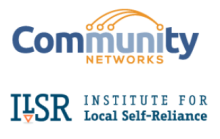
Fast, affordable Internet access for all.

The Community Broadband Networks (CBN) initiative is a program of the Institute for Local Self-Reliance, a national research and advocacy nonprofit focused on fighting corporate control and building an American economy driven by local priorities. CBN works with a diverse group of allies, partners, and local communities on policies to improve local Internet access. We also research and document what communities around the country are doing to improve access to high-quality broadband networks.
To ensure universal access to fast, affordable, and reliable Internet service.
To achieve our goal, we have determined that locally-rooted, democratically-accountable networks are the best path for long term success. We believe community-led broadband is the best option for promoting economic prosperity, improving quality of life, and ensuring access for everyone across income and background.
Most of our advocacy work centers around community networks: an umbrella term that includes various non-profit approaches, but most commonly refers to two models:
While we believe community networks are the best models, we are not opposed to for-profit approaches, and we often praise local companies that have helped to ensure fast, affordable, and reliable access to the Internet. However, we have concerns about the long-term local control of these companies due to strong pressure from Wall Street and large financial institutions to consolidate, resulting in less local accountability. This consolidation trend results in less investment in rural communities and communities of color.
Municipal and cooperative networks have proven resilient against concentration pressures, remaining locally-rooted in many contexts. While a company run by a single person or small group of people may decide to sell out to a non-local entity without any community input, decisions to change ownership of a municipal or cooperative asset are more often collective decisions. More than 100 years of electrical infrastructure experience have proven these methods as effective for delivering essential services.
While there is certainly a valuable role for state and federal governments in encouraging the development and expansion of Internet access, we believe their role should be focused in specific areas:
We support competition and choice wherever possible. The optimal solution is not one great network, but rather a series of overlapping networks, much like the Internet itself. Such a solution provides resiliency as well as incentives for innovation and investment. Some argue that the high cost of building networks makes it inefficient to encourage the construction of multiple physical networks, but we fear even democratically-accountable networks may become complacent over time without competitive pressure.
We do not want to run private Internet service providers out of business. We believe an ideal solution is to have a municipal or cooperative open access network that is competing with at least one other physical network in which all premises can choose between at least those two. Residents and local businesses could choose among different physical networks and different providers on the open network in order to ensure everyone has the proper incentives to invest, innovate, and compete. Ideally, the municipal or cooperative network should offer basic connections at $10/month or less for those in difficult financial circumstances.
We are enthusiastic about open access networks, where multiple independent Internet service providers share a single high-quality physical network to compete for subscribers. We believe many more local governments would prefer this approach to one in which they compete directly with established telecom companies. Some communities may decide to subsidize networks with taxpayer dollars in the same way that local roads are financed. Others will build them without such subsidies. We believe communities should embrace solutions that fit with local culture rather than simply trying to import a model that worked well elsewhere.
We frequently work with allies who also focus on regulatory solutions. We support many of those efforts but believe we need structural change to ensure everyone can have an affordable, high-quality Internet access connection. More than 100 years of regulatory games in electricity have demonstrated the superiority of local solutions to state or federal regulators, which suffer from well-known revolving door and capture problems. We have concerns about locating too much power in state capitals or DC — we believe the best solutions distribute power as locally as possible.
This is a realistic vision for communities that want to realize it — as long as they are located in states that haven’t foreclosed local Internet choice.
Learn more about us.
